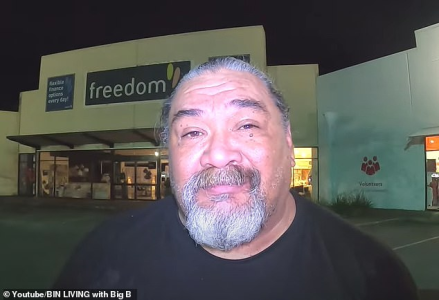You won't believe what this Western Australian dumpster diver uncovers from supermarket waste!
It's no secret that supermarkets generate a large amount of waste, especially when it comes to fresh produce items nearing their expiry dates. But one Western Australian man has decided to take matters into his own hands, transforming waste into a charitable and environmentally conscious endeavour.
Meet Brenden Rikihana, a 53-year-old Perth resident passionate about dumpster diving. By rummaging through the bins of popular supermarkets like Woolworths, Coles, and ALDI, Rikihana is on a tireless quest to uncover discarded yet still perfectly usable items—from toys and clothes to fresh vegetables, fruits, and more. And rather than hoarding his finds for personal use, he donates the vast majority to struggling families and local charities within his community.

The adventures of Rikihana, affectionately known as 'Big B’, can be followed on his 'Bin Living with Big B' social media channels, which showcase the incredible hauls he's discovered – all while raising awareness about the hidden potential in so-called supermarket 'rubbish’.
'Here we are at another ALDI, and straight off the bat, we find a whole heap of these, a whole box of Quiché Lorraine's,' Mr Rikihana says in one YouTube video, revealing the surprisingly good condition of the quiches, which still had two weeks left before their expiration date. Given their retail price of $6-$7 each, the total value of the 11 quiches he found was over $65!
Other amazing finds include bags of coleslaw, tomatoes, potatoes, bagels, strawberries, nectarines, dishwashing liquid, toothpaste, shower gels, deodorants, soaps, bread, eggs, herbs, fruit, and even boxes of chips. Rikihana also checks the quality and expiration dates of his finds, taking care only to retrieve what's still safe for consumption.
His story garnered attention, with social media users expressing their disbelief and frustration at the volume of discarded products. Many wondered why these items weren't donated to people experiencing homelessness or struggling families rather than being thrown away.
One outraged commenter voiced their disbelief, saying, 'It's actually disgusting what they throw out! Give this stuff to the homeless, you [expletive] supermarkets.'
Another chimed in, saying, 'That’s disturbing how much they waste.'
 Rikihana's admirable efforts provide a thought-provoking look at the issue of supermarket waste, as well as the considerable importance of recycling and upcycling as crucial considerations for our modern world.
Rikihana's admirable efforts provide a thought-provoking look at the issue of supermarket waste, as well as the considerable importance of recycling and upcycling as crucial considerations for our modern world.
So, next time you're shopping at your local supermarket, spare a moment to consider the plight of those in need and the importance of reducing waste. From practical initiatives such as buying only what we need and donating surplus to local food banks to repurposing household items and avoiding single-use plastics, we all have a part to play in creating a more sustainable future.
Members, have you taken any steps to reduce food waste in your own life? We'd love to hear about the actions you've taken or any strategies you've implemented to minimise food waste. Your experiences and ideas can inspire others to make positive changes as well!
Meet Brenden Rikihana, a 53-year-old Perth resident passionate about dumpster diving. By rummaging through the bins of popular supermarkets like Woolworths, Coles, and ALDI, Rikihana is on a tireless quest to uncover discarded yet still perfectly usable items—from toys and clothes to fresh vegetables, fruits, and more. And rather than hoarding his finds for personal use, he donates the vast majority to struggling families and local charities within his community.

Brenden Rikihana, 53, openly acknowledges himself as a 'scavenger' who searches through supermarket dumpsters in Western Australia, seeking products and fresh food items to donate to charitable organisations. Source: BIN LIVING with Big B/ Youtube
The adventures of Rikihana, affectionately known as 'Big B’, can be followed on his 'Bin Living with Big B' social media channels, which showcase the incredible hauls he's discovered – all while raising awareness about the hidden potential in so-called supermarket 'rubbish’.
'Here we are at another ALDI, and straight off the bat, we find a whole heap of these, a whole box of Quiché Lorraine's,' Mr Rikihana says in one YouTube video, revealing the surprisingly good condition of the quiches, which still had two weeks left before their expiration date. Given their retail price of $6-$7 each, the total value of the 11 quiches he found was over $65!
Other amazing finds include bags of coleslaw, tomatoes, potatoes, bagels, strawberries, nectarines, dishwashing liquid, toothpaste, shower gels, deodorants, soaps, bread, eggs, herbs, fruit, and even boxes of chips. Rikihana also checks the quality and expiration dates of his finds, taking care only to retrieve what's still safe for consumption.
His story garnered attention, with social media users expressing their disbelief and frustration at the volume of discarded products. Many wondered why these items weren't donated to people experiencing homelessness or struggling families rather than being thrown away.
One outraged commenter voiced their disbelief, saying, 'It's actually disgusting what they throw out! Give this stuff to the homeless, you [expletive] supermarkets.'
Another chimed in, saying, 'That’s disturbing how much they waste.'
Tips For Reducing Food Waste
Reducing food waste is an important step towards creating a more sustainable future for our planet. Thankfully, there are a few simple tips that anyone can follow to help reduce the amount of food they waste.- Plan meals in advance: By planning and preparing meals ahead of time, you can keep better track of the food you have and avoid letting it go bad.
- Take stock of pantry: Check your pantry and fridge before grocery shopping to see what food you already have. This helps you avoid buying unnecessary items.
- Shop with a list: Create a shopping list and stick to it. This prevents impulse purchases and ensures you only buy what you need.
- Utilise creative storage solutions: Consider buying food items in bulk and storing them in reusable containers or freezer bags. Proper storage helps prolong the freshness of food and reduces waste.
- Mindful shopping: Avoid buying food solely for its attractive packaging or aesthetic appeal. Also, pay attention to expiration dates, but remember that food can often still be safe to consume beyond that point. Use your senses, such as the sniff test, to assess the freshness of food.
Key Takeaways
- A dumpster diver in Western Australia has found a haul of fresh food in an ALDI bin and donated most of his haul to families in need and local charities.
- The 53-year-old searches bins at Woolworths, Coles, and ALDI and shares his adventures on his 'Bin Living with Big B' social media channels.
- In one video, Mr Rikihana found a box of quiches still in date and worth over $65.
- Social media users reacted with outrage at the amount of waste discarded by supermarkets, questioning why the items were not donated instead of being thrown away.
So, next time you're shopping at your local supermarket, spare a moment to consider the plight of those in need and the importance of reducing waste. From practical initiatives such as buying only what we need and donating surplus to local food banks to repurposing household items and avoiding single-use plastics, we all have a part to play in creating a more sustainable future.
Members, have you taken any steps to reduce food waste in your own life? We'd love to hear about the actions you've taken or any strategies you've implemented to minimise food waste. Your experiences and ideas can inspire others to make positive changes as well!








